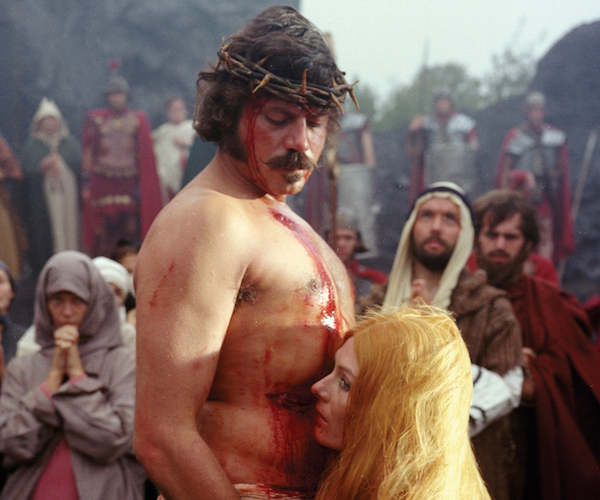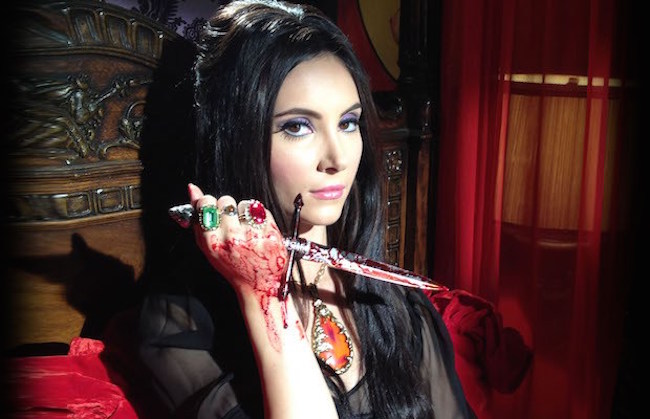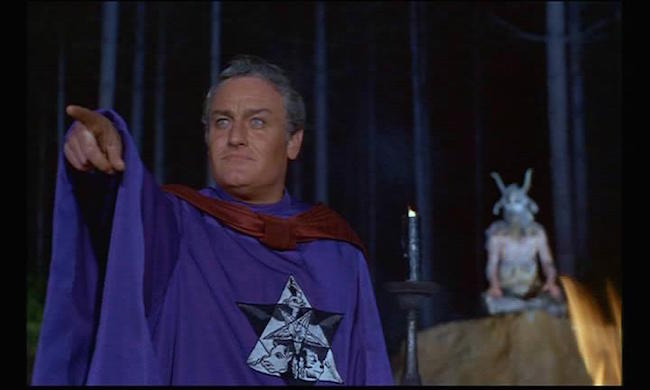Film Review: “Dead of Winter” — Horror and the Art of Living Deliciously
One of the lessons of the Brattle Theatre’s Dead of Winter series:”The occult is one of many tickets to the revolution.”

Oliver Reed and Vanessa Redgrave in Ken Russell’s 1971 classic “The Devils.”
By Peg Aloi
This weekend, Cambridge’s Brattle Theatre kicks off an unusual series that should be a lush treat for horror film buffs and book lovers alike. Dead of Winter: Cinema of the Occult (January 27 through February 2) is the brainchild of three writers: Peter Bebergal (author of Season of the Witch: How the Occult Saved Rock and Roll, a savvy pop culture memoir I enjoyed thoroughly), Janaka Stucky (a publisher and poet, whose 2015 collection The Truth is We are Perfect has attracted enthusiastic critical accolades), and Pam Grossman (founder of Phantasmaphile, author of What is a Witch, and co-organizer of the Occult Humanities Conference at NYU).
This heady cabal of three worked with Brattle co-director Ned Hinkle to curate a fabulous program made up of occult classics and rarely-seen jewels, including a number of 35mm screenings. Bebergal calls the series “a scrying glass into the myriad ways the occult imagination manifests in the popular consciousness.” The theme of the gathering is necessarily diffuse, he explains, because “our devices for understanding and playing with occult symbols are so varied. Witches, alchemy, visionary experiences, and devils all populate the landscape of these films in unique ways.” Bebergal’s book on the occult in 1970s rock and roll explores how these supernatural notions are layered into various cultural texts: “These ideas and symbols are everlasting, keying directly into our unorthodox spiritual desires, our darkest fears, our most lurid and ecstatic dreams.” On Friday night, the week-long program kicks off at 7 p.m. with a panel discussion, followed by an 8:30 screening of Robert Eggers’ gorgeous, critically-acclaimed debut film The Witch, one of 2016’s best films and a favorite of mine from last year. This entry will be followed by Clive Barker’s irreverent, suspenseful 1995 thriller Lord of Illusions, seen in 35mm.
Witches are one of the focal points for the series (yay!), and Grossman’s fascination with them may shed light on why they are becoming increasingly visible in popular culture, particularly in the wake of Donald Trump’s presidential win (a topic I explored here in November). For Grossman, “Witches are the ultimate feminist icon because, unlike most female archetypes, they have power unto themselves – they don’t draw meaning from their relationship to another person, the way mothers, virgins, queens, and whores do. They dwell on the margins of society and identity, and they have access to highly potent energy that causes profound change in the world.”

Samantha Robinson in Anna Biller’s “The Love Witch.”
Grossman will give a talk on Saturday at 7 p.m. (“What is a Witch: Female Magic & Transgression in Pictures”) followed by an 8:30 screening of what I consider one of 2016’s most innovative and visually beautiful films The Love Witch. If you missed this colorful bauble of ’70s trashy-subversive-feminist-thriller deliciousness when it played at the Kendall Square Cinema for only a week, now you have a chance to experience it in all its rainbow-sex-magic-infused glory. This is followed at 11 p.m. by the rarely-seen Belladonna of Sadness, a trippy, erotic, boldly-explicit Japanese animated film from 1973.
Other highlights include Sunday night’s double feature of Bell, Book and Candle (a 1958 color classic starring Jimmy Stewart and Kim Novak) with 35mm rarity Season of the Witch (aka Hungry Wives), a 1972 film about a suburban witches coven directed by horror master George Romero; Tuesday’s 35mm double feature teams Jacques Tourneur’s artful 1957 black and white classic Night of the Demon (aka Curse of the Demon) with Burn, Witch, Burn (aka Night of the Eagle), a 1962 film version of Conjure Wife, Fritz Leiber’s excellent 1943 novel. Both films examine the kind of female stereotyping that sparked the boisterous women’s movement of the mid-’60s. (And OMG did you see all those millions of people marching last weekend?) There is no question that the series has a decidedly feminist bent. Stucky explains that “the occult is actually something quite radical; it’s feminist and it’s a rejection of the patriarchal structures upon which the status quo has been built. The occult is one of many tickets to the revolution.”
Wednesday night brings two excellent color films from the flamboyant heyday of ’70s horror: 1973’s The Devil Rides Out (introduced by Bebergal), director Terence Fisher’s occult classic, which is based on Dennis Wheatley’s novel and stars Christopher Lee, and Ken Russell’s iconic work The Devils (1971), a controversial, steamy, disturbing, mind-blowing version of Aldous Huxley’s historical novel The Devils of Loudon. Vanessa Redgrave and Oliver Reed star; the sets were designed by a very young Derek Jarman.

Charles Gray and horned friend in 1973’s “The Devil Rides Out.”
The series ends with a scarifying bang. Thursday’s double feature showcases Alexandro Jodorowsky’s visionary 1973 film of spiritual seeking and occult blasphemy, The Holy Mountain. It will be shown in 35mm and with an introduction by Stucky. This epic will be followed by A Field in England by British director Ben Wheatley (of 2016’s High Rise, as well as Kill List, Sightseers, and Down Terrace). This unusual black and white odyssey is set in the 17th century and it is a bit like watching a hybrid of Rosencrantz and Guildenstern are Dead, Monty Python and The Holy Grail, and Carnival of Souls.
This program is the perfect antidote to dreary winter weather, post-election angst, and the imminent bombardment of Valentine’s Day frippery. Frankly, horror and occult afficionados may wish that the series never ends. The curators had a long list of films to choose from, possibly including some of my own occult faves: The Dunwich Horror, Eyes of Fire, Crowhaven Farm, Ganga and Hess, The Wicker Man, and The Ninth Configuration. You will probably have your own candidates. Dead of Night is obviously a series that needs to be revived, every year.
Peg Aloi is a former film critic for The Boston Phoenix. She has taught film studies for a number of years at Emerson College and is currently teaching media studies at SUNY New Paltz. Her reviews have appeared in Art New England and Cinefantastique Online, and she writes a media blog for Patheos.com called The Witching Hour
